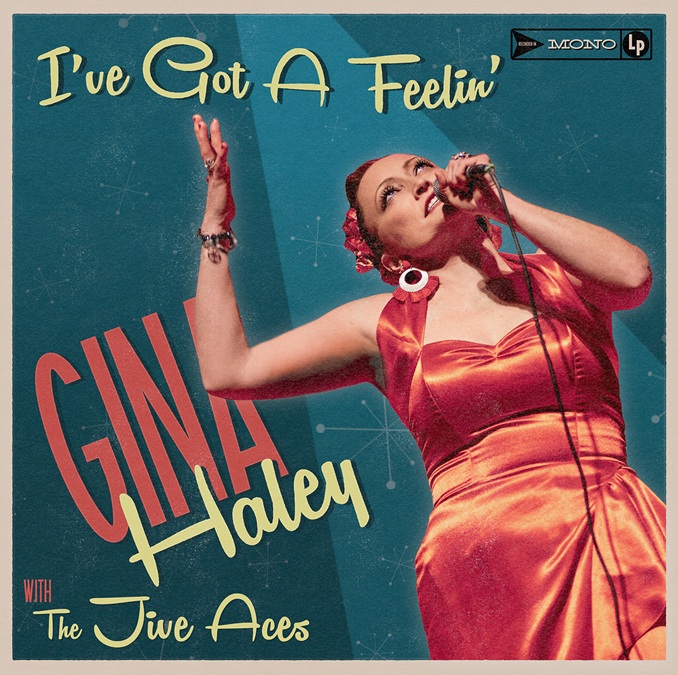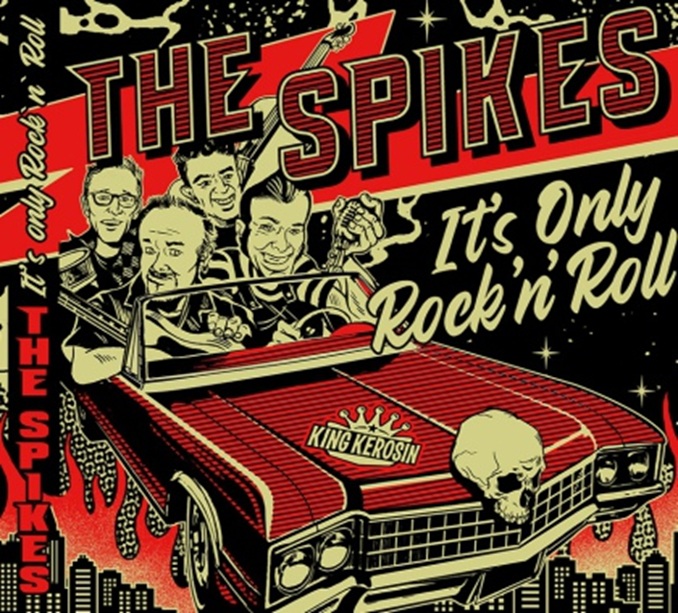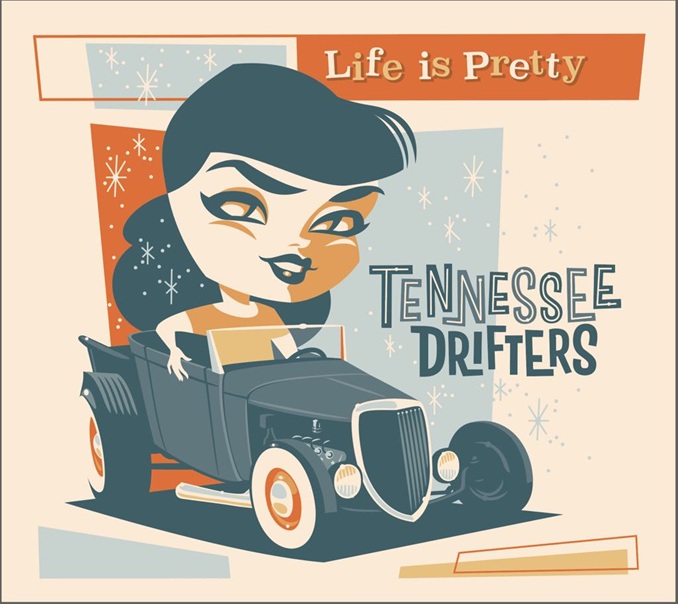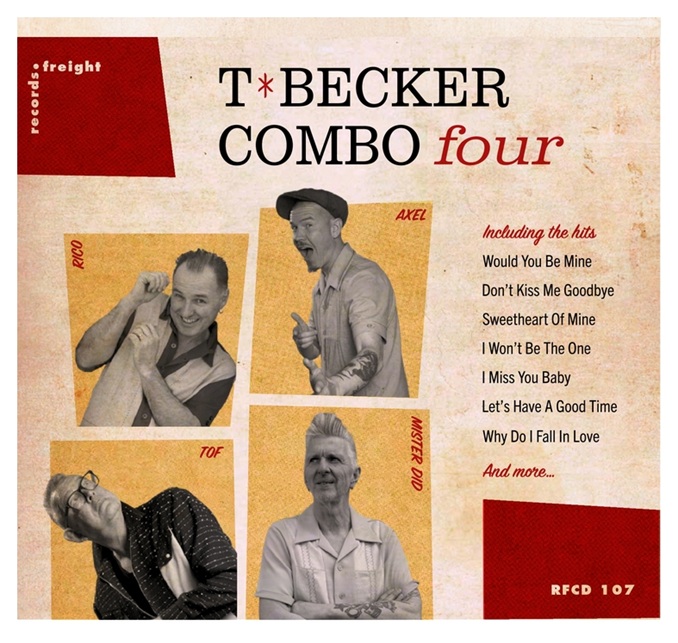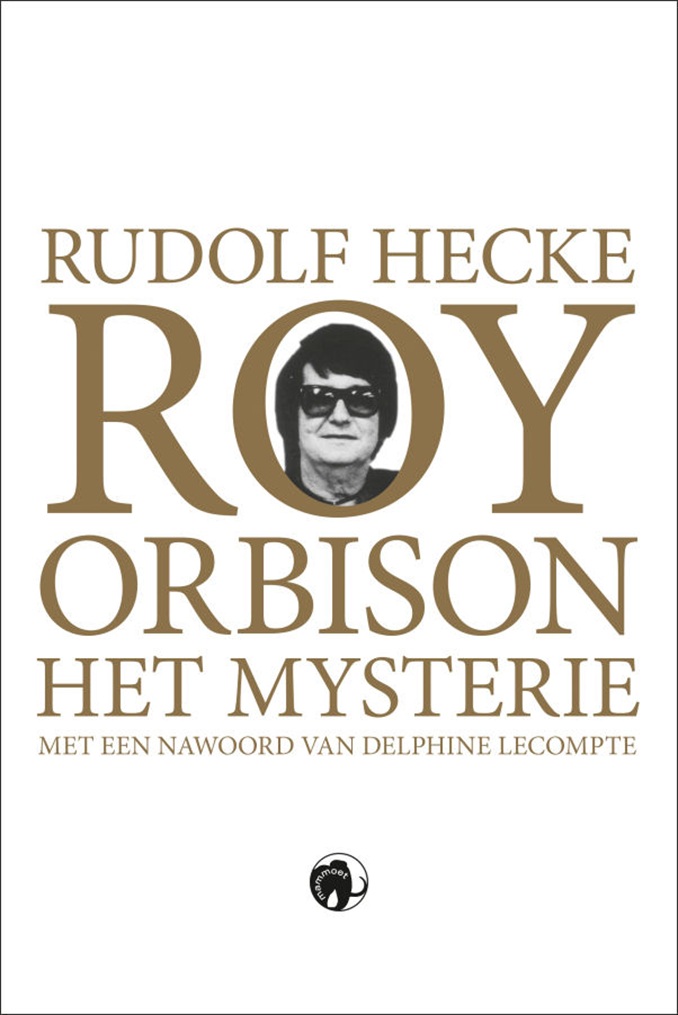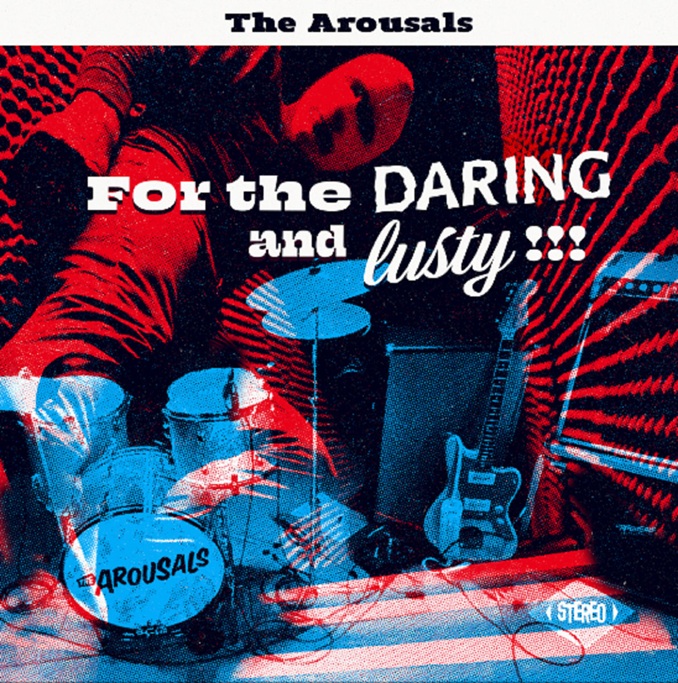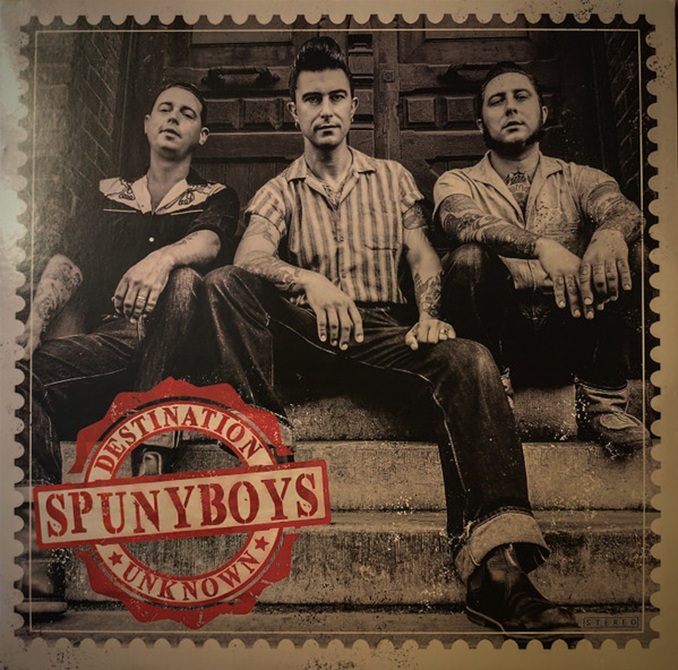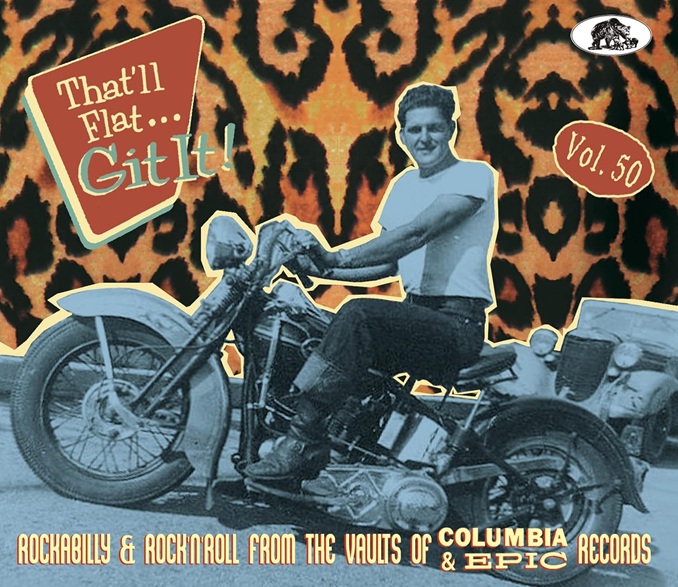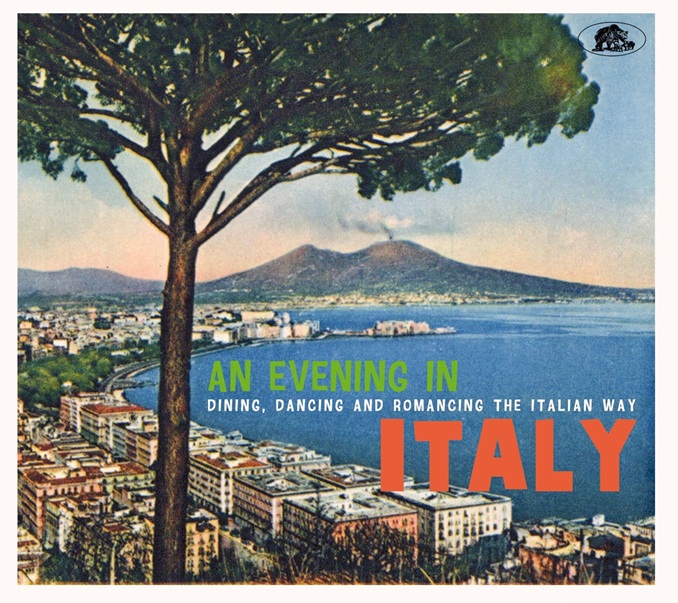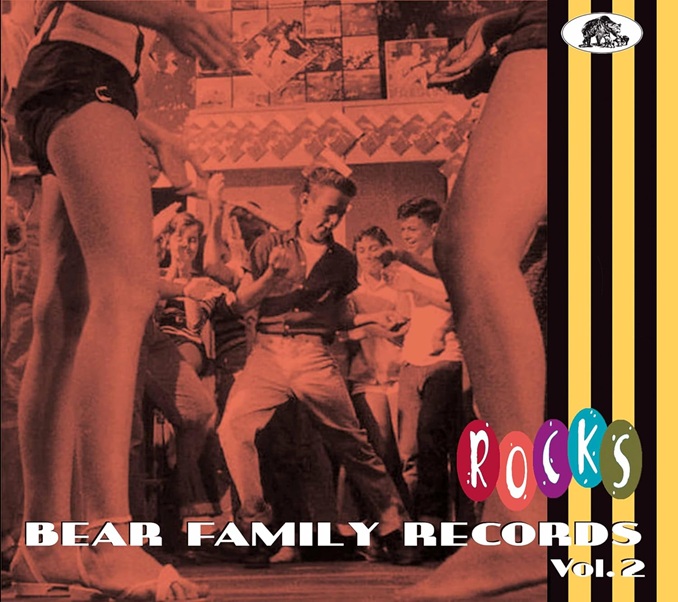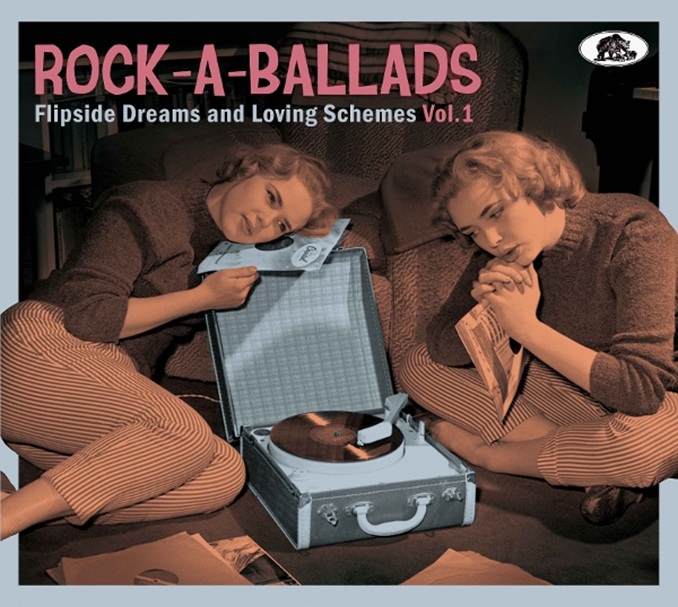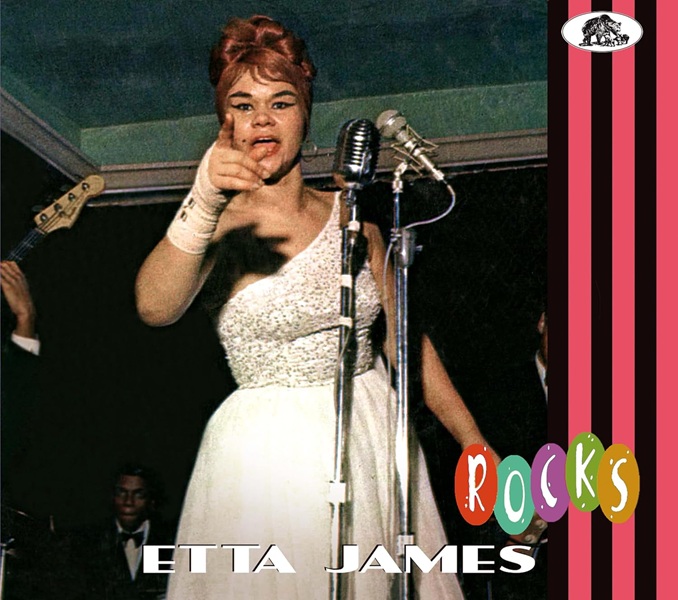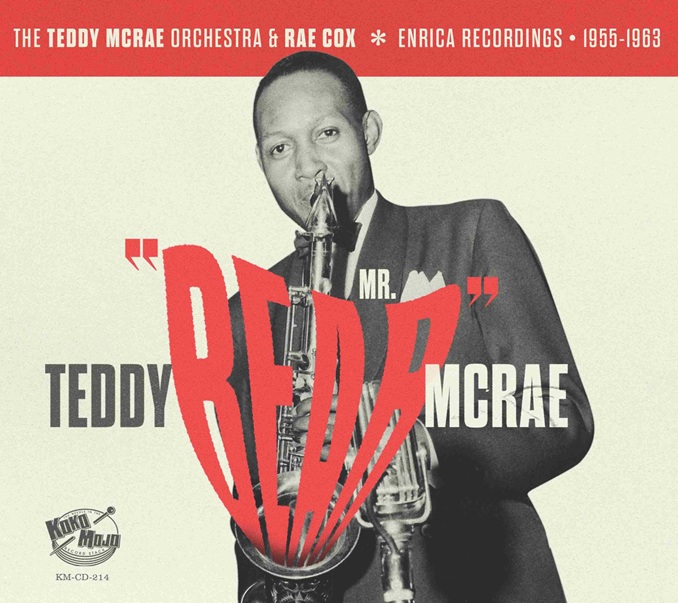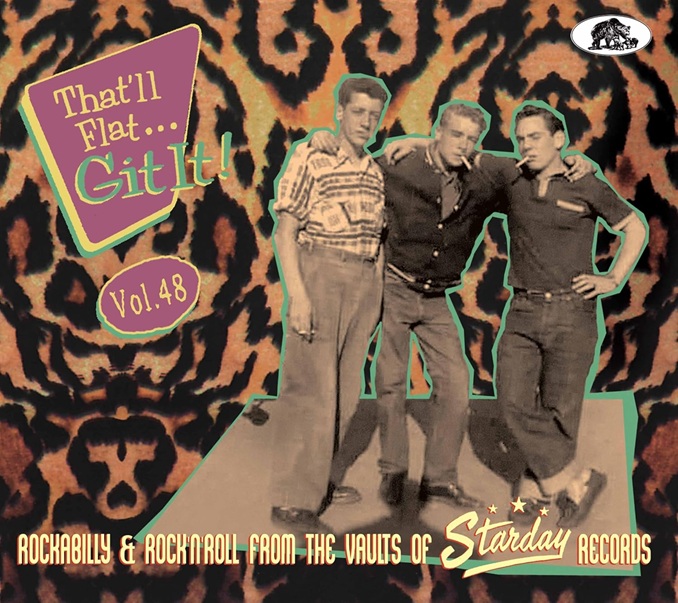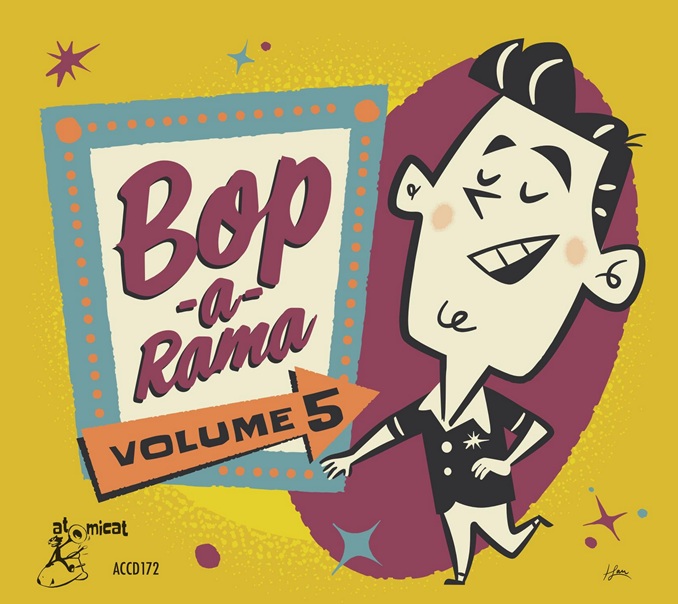
Je
recente release (muziek, boek of wat dan ook) gerecenseerd op onze website?
Stuur deze dan naar de hoofdredactie! |
24 september
2025
![]()
CD Recensies
I’VE
GOT A FEELIN'/ GINA HALEY WITH THE JIVE ACES
Rock
'n' roll royalty: Gina Haley is de jongste telg van Bill Haley die
niet alleen minstens tien kinderen maar vooral de rock 'n' roll op
de wereld zette, dat laatste nog vòòr Elvis op de proppen
kwam. En al heeft ze waarschijnlijk niet veel herinneringen aan haar
vader (toen Haley in 1981 op zijn 55ste overleed aan een hartaanval
was ze amper vijf), ze heeft in elk geval zijn muzikale genen meegekregen.
Als klassiek getrainde pianiste wou ze naar eigen zeggen popmuziek
in de stijl van Billy Joel en Elton John dan wel wereldmuziek gaan
maken, maar dochter zijn ván bleek geen deuren te openen, terwijl
ironisch genoeg de enige manieren waarop ze haar beroemde familienaam
kon uitspelen te maken bleken met Bill Haley zelf, zoals optreden
met al dan niet echte Comets. Van haar eerste album, het in 1999 in
Japan op Heat Wave International verschenen titelloze Gina Haley,
heb ik nog nooit gehoord, haar album met Haley covers begeleid door
de Britse tribute band Phil Haley & his Comments heb ik nog niet
dúrven beluisteren, maar nu is er dit album live on tape opgenomen
op twee dagen in 2020 in de inmiddels gesloten Sugar Ray's Vintage
Recording Studio in Essex met The Jive Aces, zoals algemeen geweten
een garantie voor goed geluimde swing rock 'n' roll, de scientology
versie van Louis Prima, zeg maar. Covid schoof het hele project op
de lange baan, maar nu is het album uit op CD, LP en alle digitale
platformen. De stijl is - gelukkig maar - niét Bill Haley &
the Comets maar jumpin' jive met veel blazers en piano, met naast
toch één Bill Haley hit (een big band Shake Rattle And
Roll met rhythm 'n' blues gitaar) vooral covers van zwarte rock 'n'
roll zangeressen met een tracklist die leest als een best of van zwarte
female classics. Het geheel klinkt inderdaad als een big band, want
The Jive Aces zorgden voor een paar extra gastmuzikanten als Lottie
B (wel vaker te bespeuren in het kielzog van The Jive Aces) op baritonsax
die Jive Aces John Fordham (tenorsax) en Alex Douglas (trombone) bijstaat,
Jim Knowler van The Keytones toen en Bamboozle nu op gitaar, en op
één nummer onze eigen Roy "J. Martin" Raaijmakers
die tegenwoordig het mooie weer maakt bij The Firebirds (de Duitse,
niet de Engelse) op boogie woogie piano. Hoofdpianist op het album
is evenwel Vince Hurley van The Jive Aces. Rock
‘n’ roll royalty: Gina Haley is the youngest descendant
of Bill Haley who not only put at least ten children but also rock
'n' roll onto this world, the latter even before Elvis came along.
And although she probably doesn't have many memories of her father
(she was barely five when Haley died of a heart attack in 1981 at
the age of 55), she certainly inherited his musical genes. As a classically
trained pianist she says she decided to make pop music in the style
of Billy Joel and Elton John and even world music, but being Haley's
daughter didn't open any doors, while ironically the only ways she
could capitalize on her famous family name turned out to be through
the Bill Haley connection itself, like performing with real or counterfeit
Comets. I never heard her first, self-titled album, released in Japan
in 1999 on Heat Wave International, and I didn't yet dare listen to
her album of Haley covers accompanied by UK tribute band Phil Haley
& his Comments, but now there's this album, recorded live on tape
in the course of two days in 2020 at the now defunct Sugar Ray's Vintage
Recording Studio in Essex with The Jive Aces, known all over the world
as a guarantee for good-humored swing rock ‘n’ roll, the
scientology version of Louis Prima, so to speak. Covid put the project
on hold, but now the album is out on CD, LP, and all digital platforms.
Fortunately the style is not Bill Haley & the Comets but jumpin'
jive with lots of horns and piano, featuring one Bill Haley hit (a
big band Shake Rattle And Roll with rhythm ‘n’ blues guitar)
but mainly covers of black female rock ‘n’ roll singers
with a tracklist that reads like a best of black female classics.
The whole thing does indeed sound like a big band because The Jive
Aces brought in a few extra guest musicians such as Lottie B (often
seen in the wake of The Jive Aces) on baritone sax who assists Jive
Aces John Fordham (tenor sax) and Alex Douglas (trombone), Jim Knowler
from The Keytones then and Bamboozle now on guitar, and on one track
Roy “J. Martin” Raaijmakers from Holland who currently
plays with The Firebirds (the German ones, not the British ones) on
boogie woogie piano. The main pianist on the album is however Vince
Hurley from The Jive Aces. |
IT'S
ONLY ROCK 'N' ROLL/ THE SPIKES
Zin in een kwartiertje pure rock 'n' roll? Dan bent U bij The Spikes aan het goeie adres: potige sound en goeie covers van Broken Heart van The Moonlighters (ietsje sneller dan de gemiddelde Broken Heart) en Fancy Dan van Gene Summers, met zelfverzekerde zang, gas erop en uit de kluiten gewassen solo’s op de gitaar, gewoonlijk twee per nummer. Dat ze all round zijn bewijzen ze met hun knappe twangy Elvis versie van Lonely Blue Boy van Conway Twitty inclusief achtergrondkoortje, en er is nog Elvis met One Night With You als stevige stroll. Dat ze de mosterd niet alleen halen bij de klassiekers maar ook bij hedendaagse bands bewijst hun Long Black Shiny Car gebaseerd op de Restless versie, niet op de jaren '50 original van Mike Page. Frontman Matthias Lefkes zingt de intro slordiger dan Mark Harman van Restless en de gitaar klinkt meer Vietnam. Ook Lonely Blue Boy en One Night With You zingt Lefkes zoals Harman die nummers zou kunnen zingen. The Spikes komen uit Heidelberg en Stuttgart, zijn met zijn vier (altijd handig om backstage een kaartje te leggen), en voor de volledigheid vermeld ik dat ze naast Matthias Lefkes (zang) bestaan uit Volker Riegler (gitaar, al tegengekomen in The Pinstripes), Isi Cetinkaya (contrabas) en Jens Weidenheimer (drums) en actief zijn sinds 1993. Da's meer dan dertig jaar, en daarom verbaast me dat ik ze niet ken, want ze hebben minstens één full CD uit. Deze It's Only Rock 'n' Roll is een mini CD'tje met slechts vijf nummers en meer moet dat voor ons soms niet zijn op een goeie dag. Kunnen The Stripes op die manier een uur, anderhalf uur, twee uur vullen? Ik twijfel er niet aan en hoop ze ooit eens live te kunnen zien zonder dat ik ervoor naar Duitsland moet karren. Dit is in elk geval een tof visite kaartje! Info: www.the-spikes.de (Frantic Franky)
Fancy fifteen minutes of pure rock ‘n’ roll? Then The Spikes are perfect for the job: a powerful sound and great covers of The Moonlighters' Broken Heart (slightly faster than the average Broken Heart) and Gene Summers' Fancy Dan, with confident vocals, pedal to the metal and impressive guitar solos, usually two per song. They prove their versatility with a clever twangy Elvis version of Conway Twitty's Lonely Blue Boy including backing vocals, and there's more Elvis with One Night With You played as a solid stroll. Long Black Shiny Car, based on the Restless version rather than the 1950s original by Mike Page, shows that they draw inspiration not only from the classics but also from contemporary bands. Frontman Matthias Lefkes sings the intro more sloppily than Restless' Mark Harman and the guitar sounds more Vietnam. Lefkes also sings Lonely Blue Boy and One Night With You the way Harman might sing 'em. The Spikes hail from Heidelberg and Stuttgart and are four in number (always handy for playing cards backstage) with besides Matthias Lefkes (vocals), Volker Riegler from The Pinstripes on guitar, Isi Cetinkaya on double bass and Jens Weidenheimer on drums. They've been playing since 1993 which is over thirty years, so I'm surprised I never heard of them, for they released at least already one full CD. This here It's Only Rock ‘n’ Roll is a mini CD with only five songs, and sometimes that's all we need on a good day. Can The Stripes fill an hour, an hour and a half, two hours that way? I do no doubt it and hope to be able to catch them live someday without having to drive all the way to Germany. In any case, this is a great calling card! Info: www.the-spikes.de (Frantic Franky) |
17 september 2025
![]()
LIFE
IS PRETTY/ TENNESSEE DRIFTERS
Dit is 'em, het albumdebuut van The Tennessee Drifters. Werd tijd
ook onderhand, want de vooruitgeschoven Rocking Rebel Records RRR-999
vinyl single Rocking Rebels Rock On/ Private Eye, een gelimiteerde
oplage van 500 persingen, was veelbelovend maar zette vooral gastzanger
Marcel Hoitsema van Bang Bang Bazooka in het zonnetje. Dat zit zo:
Rob van Sambeek drumde ooit nog een tijdje bij Bang Bang Bazooka,
vandaar. The Tennessee Drifters spelen soms samen met Hoitsema en
vormen op die manier ook een soort Bang Bang Bazooka, maar eigenlijk
zijn ze in de eerste plaats zichzelf, The Tennessee Drifters uit Eindhoven
Rockcity en voor een stukje uit Alkmaar, naast Rob van Sambeek op
de trommels Peter de Wit van Slapback Johnny op contrabas en Jeroen
van Delden van Supersonics en Texarkana Trio op gitaar. Geeft u ze
een daverend applaus! Peter en Jeroen verdelen de zang (met op enkele
songs backing vocals van Marcel) van de veertien eigen nummers (géén
covers), met Rocking Rebels Rock On / Private Eye geschreven door
Bang Bang Marcel, maar daarvoor moet u maar even terugscrollen naar
onze recensie van die single. Het mooie aan Life Is Pretty, behalve
dat ie goed is, is dat ie varieert qua rock 'n' roll stijlen, in tegenstelling
tot van die albums waarvan alle veertien songs eigenlijk krak hetzelfde
klinken. De audio zelf, misschien ietsje opener en lichter dan de
single met Marcel Hoitsema, is een zelfverzekerd en stevig maar warm
geluid waarin wij ons graag koesteren. Stijlvariatie is inderdaad
troef: de CD begint met de wilde rechtdoor rockabilly stop-starter
Boppin' My Life Away met twee vlammende dubbele gitaarsolo’s,
een nummer waarin niet alleen de teddyboys onder jullie zich zullen
kunnen vinden. Ook Tennessee Boogie, Made Up My Mind, titeltrack Life
Is Pretty en Fifteen Cats, een soort mix tussen Sixteen Chicks van
Joe Clay en Rockabilly Guy van The Polecats, zijn volwassen rockabilly
rockers. Fallin' Down The Drain is een wat relaxter stop-start rockabilly
shuffle met een contrabas solo, terwijl het urgentere You Dragged
Me Down flirt met elementen van bluesbop én Johnny Cash én
de gitaarsolo richting rock gaat. Double Blue Boogie is een kruising
tussen bluesbop en rockabilly met gast-mondharmonica van Adri Matheussen
(bluesrock band DeSoto, bluesband The Blackhawks), en met Liquor Blues
staat er zelfs een pure blues op, opnieuw met mondharmonica, maar
ter verdediging kan je aanvoeren dat ie op een stroll tempo is. Er
is ook aandacht voor de country poot van de rockabilly met het western
galopperende Fade Away en het al even mooi melodieuze Fly Away en
Free. De twangy meezinger Rocking Rebels Rock On hint zelfs naar glamrock!
Here it is, The Tennessee Drifters' debut album. About time too, as the advance Rocking Rebel Records RRR-999 vinyl single Rocking Rebels Rock On/ Private Eye, a limited edition of 500, was very promising but mainly put the spotlights on guest singer Marcel Hoitsema from Bang Bang Bazooka. This came about through Rob van Sambeek who used to drum for Bang Bang Bazooka for a while, hence the connection. The Tennessee Drifters sometimes play with Hoitsema which makes them a kind of Bang Bang Bazooka, but they are first and foremost themselves, The Tennessee Drifters from Eindhoven Rockcity and partly from Alkmaar, alongside Rob van Sambeek on drums Peter de Wit from Slapback Johnny on double bass and Jeroen van Delden from Supersonics and Texarkana Trio on guitar. A big round of applause! Peter and Jeroen share the lead vocals (backed by Marcel Hoitsema on a couple of songs) on the fourteen original songs (no covers) of which Rocking Rebels Rock On / Private Eye were written by Bang Bang Marcel, but for that you'll have to scroll back to our review of the 45. The great thing about Life Is Pretty, apart from the fact that it's good, is that it varies in terms of rock ‘n’ roll styles, unlike all those albums where all fourteen songs sound pretty much the same. The audio sound itself, perhaps slightly more open and lighter than the 45 with Marcel Hoitsema, is confident and solid yet warm, a sound we love to bask in. As mentioned the album's trump card is stylistic variety: the CD kicks off with the wild, straight ahead rockabilly stop-starter Boppin' My Life Away with two blistering double guitar solos, a song that will appeal not only to the teddy boy crowd. Tennessee Boogie, Made Up My Mind, title track Life Is Pretty and Fifteen Cats, kind of a mix between Joe Clay's Sixteen Chicks and The Polecats' Rockabilly Guy, are also mature rockabilly rockers. Fallin' Down The Drain is a relaxed stop-start rockabilly shuffle with a double bass solo, while the more urgent You Dragged Me Down flirts with elements of blues bop as well as Johnny Cash with a guitar solo leaning toward rock. Double Blue Boogie is a cross between blues bop and rockabilly with guest harmonica by Adri Matheussen (blues rock band DeSoto, blues band The Blackhawks), while Liquor Blues is a real blues, again with harmonica, but in its defense one could argue it's taken at a stroll tempo. They also veer toward the country side of rockabilly with the western galloping Fade Away and the equally melodious Fly Away and Free. The twangy singalong Rocking Rebels Rock On even hints at glam rock! The votes are in and the jury has decided: Tennessee Drifters have mastered all the rockabilly clichés, but more important is that they can play 'em damn well and give 'em a cool interpretation of their own. Whether life has become prettier with this album I'll leave open to debate, but fact is there's some more great music on it. The album is available on all streaming services, but for € 10 + shipping you can have the CD delivered to your door. Rest assured: vinyl is on the way. Info: www.facebook.com/tennesseedriftersrockabilly (Frantic Franky) |
FOUR/
T BECKER COMBO
Waarom
de zaken moeilijk maken als het makkelijk kan: het vierde album in
zes jaar van het Noord-Franse drumloze T Becker Trio heet gewoon Four
(hun tweede heette Second Round en hun derde Third Time's A Charm).
Alleen is Four niet het vierde album van T Becker Trio maar het eerste
album van T Becker Combo, en dat is T Becker Trio + een drummer. Four
doet ons evenwel nog steeds doen denken aan het beste van de jonge
High Noon, nog steeds dé referentie op het gebied van drumloze
trio’s, en het feit dat wij die vergelijking reeds trokken als
T Becker Trio bewijst dat de drums die ze nu toevoegen hun sound niet
wezenlijk verandert. Eric "Rico" Bessenay van Pete &
the Starphonics probeert immers niet zoveel mogelijk potten en pannen
te raken, continu white rock roffels af te rammelen of zelfs maar
te swingen, maar stelt zich volledig ten dienste van het T Becker
geluid dat we gewend zijn van Christophe "Tof" Becker (zang,
akoestische gitaar), Axel Ribard-Becker (contrabas) en Didier Doudement
(gitaar). Hoogstens gaat ie tijdens een gitaarsolo eens ietsje harder
meppen. Opener Bop A Billy Bop is gelijk een lichtjes fantastische
uptempo bopper (luister hoe mooi die tweede stem meezingt in het refrein),
ook Why Do I Fall In Love, Don't Kiss Me Goodbye, Would You Be Mine,
I'm Back, het speelse Sweetheart Of Mine, het wat Johnny Cash-achtige
Too Late en het mysterieuze, spookachtige western I Want It All zijn
heel fijne uptempo nummertjes, maar eigenlijk zijn ze dat allemaal.
Zoals gezegd doen de dertien nieuwe eigen songs (ook op hun eerste
drie albums stond geen enkele cover) nog steeds denken aan High Noon,
door de opbouw van de nummers, de uitvoering en de fingerpickende
gitaar, en omdat het timbre van Christophe Becker's stem die klinkt
alsof ie een aardappel rondtolt in zijn mond vergelijkbaar is met
Shaun Young. Een andere vergelijking zou je kunnen maken met The Barnshakers
uit Finland, maar iets wat ik nog niet eerder hoorde, in hun Trio
vorm althans, zijn echo’s van Restless. Niet dat ze ineens neo
spelen, absoluut niet, maar 't zit 'em in hier een modern akkoord,
daar een klankflard, mogelijk onbewust. Why complicate matters when simple does it? The fourth album in six years by the drumless T Becker Trio from the north of France is simply called Four (their second was called Second Round and their third Third Time's A Charm). Four is however not the fourth album by the T Becker Trio but the first album by the T Becker Combo, which is T Becker Trio + a drummer. The album still reminds us of the best of the young High Noon, the absolute benchmark when it comes to drumless trios, and since we already made that comparison in the T Becker Trio days it means the drums they add now does not significantly change their sound. Eric “Rico” Bessenay from Pete & the Starphonics does not try to hit as many pots and pans as possible, bang white rock fills non stop or even swing, but puts himself entirely at the service of the T Becker sound that we know and love from Christophe “Tof” Becker (vocals, acoustic guitar), Axel Ribard-Becker (double bass) and Didier Doudement (guitar). At the most he might hit those skins a little harder during a guitar solo. Opening track Bop A Billy Bop is a slightly fantastic uptempo bopper (pay attention how beautifully that second voice sings along in the chorus) and so are Why Do I Fall In Love, Don't Kiss Me Goodbye, Would You Be Mine, I'm Back, the playful Sweetheart Of Mine, the somewhat Johnny Cash styled Too Late and the mysterious, spooky western I Want It All, but as a matter of fact all the tracks are very nice uptempo songs. As I said these thirteen new original songs (their first three albums didn't contain any covers either) are still reminiscent of High Noon due to the structure of the songs, the performance and the fingerpicking guitar, and also because the timbre of Christophe Becker's voice, sounding like he's rolling a potato around in his mouth, is similar to Shaun Young's. Another comparison could be The Barnshakers from Finland, but something I haven't heard before, at least not in T Becker Trio, are echoes of Restless. Not that they suddenly play neo, far from it, but Restless resonates in a modern chord here, a sound snippet there. What it comes down to is that adding a drummer has given the T Becker Trio an injection with new energy, the biggest asset being that Four almost entirely consists of uptempo songs and boredom doesn't get a chance. It's certainly not the wildest rockabilly CD of the year, but it might very well be the most melodic and therefore one of the best, taking into consideration that the year is already entering its final quarter. T Becker Combo sparkles, and this CD is one for the real fans of the genre. Info: www.rocking-all-life-long.com and www.tbeckertrio.wixsite.com/tbeckercombo (Frantic Franky) |
10 september 2025
![]()
Boek Recensie
ROY
ORBISON, HET MYSTERIE/ RUDOLF HECKE
Roy
Orbison was de grootste balladeer van het rock 'n' roll tijdperk,
en als dat voor u niet volstaat herinner ik u er graag aan dat hij
zijn carrière begon met voortreffelijke rockabilly op het Sun
label. Met andere woorden: The Big O was there when it happened. Dit
is het eerste Nederlandstalige boek over Roy Orbison en het leest
als een trein, als een Big Train From Memphis als het ware, ware het
niet dat de grootste brillekas sinds Buddy Holly niet uit Memphis
maar uit het godverlaten gat genaamd Wink, Texas kwam. Ik heb ooit
een Engelstalig boek over hem gelezen, Dark Star: The Roy Orbison
Story van Ellis Amburn uit 1990, maar dat boek heb ik niet meer. Nu
ik het zo even nakijk bestaan er nog verschillende boeken over Roy
Orbison, met name Only The Lonely: Roy Orbison's Life And Legacy van
Alan Clayson (1989), Rhapsody In Black: The Life And Music of Roy
Orbison (2013) van John Kruth, en The Authorized Roy Orbison (2017)
van Orbison's zonen Roy Jr, Wesley en Alex Orbison, met dank aan de
research van Marcel Riesco. In hoeverre de Vlaming Rudolf Hecke zich
op die bestaande biografieën heeft gebaseerd kan ik dus helaas
niet zeggen. Er staat géén bronvermelding of bibliografie
in zijn boek, dus ik denk niet dat hij naar Amerika is getrokken om
daar zelf nog levende getuigen op te zoeken, in zoverre die er uitgezonderd
Orbison's zonen nog zijn natuurlijk. Hecke lijkt zich vooral te hebben
gebaseerd op in de internationale pers verschenen archief interviews
met Orbison zelf. En toch, die beschrijvingen van Wink zijn zo levendig
dat het lijkt of hij ter plekke is geweest, dus ik vraag me af waar
hij ze heeft gehaald. Wel maakt de auteur veelvuldig gebruik van de
herinneringen en de foto’s van Ad Swart van de Nederlandse Roy
Orbison fanclub die de meester vanaf de jaren '60 verschillende keren
heeft ontmoet en in concert gezien. Heel af en toe wordt een
stelling niet gestaafd, en het al lang naar de prullenbak verwezen
gerucht dat Elvis optrad in een TV show van Orbison's jaren '50 rockabilly
band The Teen Kings wordt nog maar eens herhaald. Dat is een van de
detailfouten die een beetje slordig overkomen, en zo staan er helaas
nog een paar in. (Oh) Pretty Woman is bij mijn weten niét gecoverd
door Elvis noch door Frank Sinatra, en "Gene Thomas and The Allisons"
hebben nooit een nummer van Roy Orbison opgenomen, wel Gene Thomas
(The Last Song) en The Allisons (Sugar Love), dus dat lijkt mij letterlijk
overgenomen uit het Engels. Welke door Orbison geschreven song is
trouwens opgenomen door Patsy Cline? You're In The Army Now van The
Andrews Sisters is Boogie Woogie Bugle Boy, Hey Miss Fanny moet Hey
Miss Fannie zijn. Searching van The Everly Brothers? Nooit van gehoord.
Het muziekmagazine Luney Tunes is mij onbekend. Dat moet het Nederlandse
popblad Tuney Tunes zijn, net zoals het natuurlijk Gretsch in plaats
van Gretch gitaar is. Stellen dat Beautiful Dreamer de inspiratie
vormde voor Bobbejaan Schoepen's Café Zonder Bier is te kort
door de bocht: Schoepen vertaalde gewoon Slim Dusty's A Pub With No
Beer, wat inderdaad gschreven werd op de melodie van Beautiful Dreamer,
een melodie die teruggaat tot het midden van de 19de eeuw. Het leven
van Johnny Cash kaatste niet over hobbels van celstraffen (Cash heeft
zeven keer de nacht doorgebracht in een politiecel maar is nooit veroordeeld
tot een gevangenisstraf), en de drie mannen die gearresteerd werden
omdat ze Elvis' dode lichaam wilden opgraven om losgeld te eisen behoorden
niet tot de Memphis Mafia. Een enkele keer vergist de auteur zich
bij de omzetting van oude Belgische franken naar hedendaagse euro’s,
en als 1 dollar 10 euro en 400 dollar ruim 4000 euro is kan 15 dollar
nooit 250 euro zijn. |
3 september 2025
![]()
Vinyl Recensie
FOR
THE DARING AND LUSTY/ THE AROUSALS
Surf bands komen en gaan, maar surfgitaristen blijven bestaan: The Arousals (B) zijn een trio rond gitarist Christoph Boost en basgitarist Andy Wellens die tien, vijftien jaar terug samen in Los Venturas speelden, in The Arousals aangevuld door de mij onbekende drummer Tom Cools. Spelen Los Venturas eigenlijk nog? Dit is na een demo CD-R twee jaar geleden hun officiële debuut EP, een Record Store Day release gelijk op vinyl, en die klinkt geweldig in een mooie, cleane sound, met drie eigen nummers + één cover, het vrolijk frisse Avalanche van Don & the Galaxies dat The String-A-Longs echoot in een twangiër gitaarklank, met voor de goede orde een drumbreak en een scream. De EP opent evenwel broeierig met het dreigend trage The Penetrator, tergend traag, trager dan een stroll, met uiteraard de gitaar upfront maar met een orgeltje ergens achterin: een net geen twee minuten durende dreun. The Arouser is moderne surf met overdubde gitaren (ik hoor er minstens drie), een stukje Link Wray en gegil dat klinkt alsof het uit een goedkope griezelfilm komt, en de EP eindigt met een stroll met de klassieke gitaarintro van Please Give Me Something van Bill Allen & the Backbeats waarmee uiteraard menige rock 'n 'roll boogies opent, en inderdaad draait ook deze Dirty Boogie Beat plezante rock 'n' roll rondjes. Je hoort en merkt dat hier is nagedacht over hoe alles moet klinken in plaats van gewoon de bandopnemer te laten lopen, en er zit dan ook veel meer in dan enkel reverb en de genre definiërende blubbergitaren, met name iets tegendraads, weerhaakjes, iets dat zit te wachten om eruit te springen, een toefje si(ck)xties, wat ze wellicht hebben bewaard voor op de podia. In elk geval vormen deze twee opgewekte tracks + twee meer duistere nummers samen een mooi staalkaartje van wat The Arousals live neerzetten. Wit vinyl, 300 stuks. Need I say more? Surf Cookie is een surflabel uit Griekenland, dus de handigste manier om dit kleinood te bemachtigen is via de groep zelf. Ze bijten niet! Info: www.surfcookierecords.bandcamp.com and www.facebook.com/TheArousals (Frantic Franky) Surf bands come and go, but surf guitarists are here to stay: The Arousals (B) are a trio centered around guitarist Christoph Boost and bass guitarist Andy Wellens who played together in Los Venturas ten, fifteen years ago. In The Arousals they are joined by drummer Tom Cools who I am unfamiliar with. Are Los Venturas still playing? After a demo CD-R two years ago this is their official debut EP, a Record Store Day release on vinyl, sounding fabulously great with a beautiful, clean sound and featuring three original tracks + one cover, the cheerfully fresh Avalanche from Don & the Galaxies which echoes The String-A-Longs with a twangier guitar sound, with for good measure a drum break and a scream. The EP however opens sultrily swampy with the menacingly slow The Penetrator, agonizingly slow, slower than a stroll, with the guitar of course up front but with an organ hiding somewhere in the background: a pounding that lasts just under two minutes. The Arouser is modern surf with overdubbed guitars (I hear at least three guitars), a bit of Link Wray and screams that sound like they were lifted from a cheap horror movie. The EP ends with a stroll that features Bill Allen & the Backbeats' classic Please Give Me Something guitar intro, also used in many more rock ‘n’ roll boogies, and this here Dirty Boogie Beat is indeed spinning round in pleasant rock ‘n’ roll circles. You notice and hear that a lot of thought has gone into how everything should sound, rather than simply turning on the tape recorder. There is much more to this EP than only reverb and the genre-defining blubbery guitars, something tricky and contrary, lurking in there waiting to jump out, a little bit of si(ck)xties, which they probably save for the stage. In any case these two cheerful tracks + two darker tunes are a nice sample of what The Arousals deliver live. White vinyl, 300 copies. Need I say more? Surf Cookie is a surf label from Greece, so the easiest way to get your hands on this gem is through the band itself. They don't bite! Info: www.surfcookierecords.bandcamp.com and www.facebook.com/TheArousals (Frantic Franky) |
![]()
CD Recensies
DESTINATION UNKNOWN/
SPUNYBOYS
Wie Spunyboys nog nooit heeft gezien leeft al een paar jaar op een andere planeet, want Rémi (zang/stuntwerk op de contrabas), Eddie (gitaar) en Guillaume (drums) Spuny wonen niet zozeer in hun hometown Lille (F) als in hun tourbusje en kennen ook Nederland intussen als hun broekzak. Hun muziek is een mix van rechtdoor gitaar rock 'n' roll en springerige rockabilly, soms stroll, soms Bo Diddley, met surfgitaar of een beetje swing of uptempo rhythm 'n' blues, zelfs een mespuntje glamrock, heel af en toe met een modern pop/rock akkoord ertussen, kortom in zowat elke rock 'n' roll stijl, steevast in een wat onstuimige chaotische sound, met voor de goede orde daartussen een occasionele cover als I'm A One Woman Man (Johnny Horton), That's Alright (Mickie Most), de meestamper How Low Can You Feel (Ray Campi), Lights Out (Jerry Byrne), El Camino Real (Lee Dresser) en zelfs Better Be Home van onze eigen Ronnie Nightingale & the Haydocks. Een aantal van hun eigen nummers zijn dan weer duidelijk gekalkeerd van fifties nummers. 't Is duidelijk dat ze rock 'n' roll spelen omdat ze dat niets liever doen, met een aanstekelijk enthousiasme dat zich vertaalt zowel op het podium als op geluidsdrager, zij het dat die geluidsdragers omdat ze alles zelf doen, ook hun eigen platen opnemen, door het niet inhuren van een externe producer resulteren in een ongepolijste, niet opgeleukte sound, met vooral Just A Lille Beat uit 2020 als voorbeeld van opnemen wat gespeeld wordt en niets meer. Het goede nieuws is dat hun vierde langspeler de variatie van Moonshine (2020) bevat maar vanaf de catchy rockende opener Fame In Vain teruggrijpt naar de krachtige doch heldere sound van hun albumdebuut Rockabilly Legacy uit 2013 op Tombstone Records (NL). Wat ik ze nog niet vaak heb horen doen is de sixties/seventies countryrock van Good Man Deep Down en Better Son Since I'm A Dad, nummers die je eerder verwacht bij Smokestack Lightnin' en het hele legertje gelijkaardige Duitse bands. Ik denk dat ze op Destination Unknown ook voor het eerst een ballade zingen, de titeltrack Destination Unknown gebracht in swamp pop stijl, wat ook Frans van Dongen is opgevallen in zijn recensie van hun optreden in Etten-Leur op 22 december jongstleden. Nog meer voorbeelden van die variatie: Lilly-Mai is een toffe melodieuze wat country getinte stroller, Blowin In The Howlin Wind is pop 'n' roll (dat achtergrondkoortje) zonder negatieve connotatie op een ska blues bop ritme, Two Flames Boogie is blues bop gezongen met een ZZ Top grafstem, en Driven By Blues baadt dan weer in een uptempo bluesy bayou swamp. Ook nu laten ze onbeschaamd hun invloeden horen: de tweede solo van Do Right Do Write is pure Johnny Burnette Rock 'n' Roll Trio, en ook dit keer is er een cover van een nummer van een Nederlandse band, In Dreams, vinniger en sneller dan Mischief! Razende rechtdoor rockers als Coffee Tox ontbreken niet, en Rémi eindigt de CD met een bredere lach dan gewoonlijk met hun cover van Roger Miller's komische Dang Me in rockabilly uitvoering, de tweede van de enige twee covers op de veertien songs. Het geheel is zoals gezegd opgenomen in een erg heldere, kwalitatief hoogstaande volle sound, soms met de lead vocal dubbel getracked. En het slechte nieuws? Dat is er niet! Ook uit op vinyl LP. Info: www.facebook.com/spunyboys and www.spunyboys.bandcamp.com (Frantic Franky) If you've never seen Spunyboys you must have spent the last ten years on another planet, for Rémi (vocals/stunt work on double bass), Eddie (guitar) and Guillaume (drums) Spuny live more in their tour van than in their hometown Lille (F). Their music is a mix of straightforward guitar rock ‘n’ roll and bouncy rockabilly, sometimes strollin', sometimes Bo Diddley, with surf guitar or a bit of swing or uptempo rhythm ‘n’ blues, even a pinch of glam rock, very occasionally with a modern pop/rock chord somewhere in there, in short just about every rock ‘n’ roll style, invariably in a somewhat boisterous chaotic sound, and for good measure the occasional cover like I'm A One Woman Man (Johnny Horton), That's Alright (Mickie Most), the stamp along How Low Can You Feel (Ray Campi), Lights Out (Jerry Byrne) and El Camino Real (Lee Dresser). On the other hand some of their own songs are clearly based on fifties tunes. It's quite obvious that they play rock ‘n’ roll because they're nothing they like more, and they play it with an infectious enthusiasm both live on stage and on soundcarrier, albeit that because they do everything themselves, including recording their own records without an outside producer, those sound carriers result in an unpolished, unadorned sound, with 2020's Just A Lille Beat in particular being an example of what they play is what you get and nothing more. The good news is that their fourth full length album contains the variation of Moonshine (2020) but right form the first track, the catchy rockin' Fame In Vain, reverts to the powerful yet bright sound of their 2013 album debut Rockabilly Legacy on Tombstone Records (NL). What I haven't heard them do often is the sixties/seventies country rock of Good Man Deep Down and Better Son Since I'm A Dad, songs you'd rather expect from Smokestack Lightnin' and all those similar German bands. I think a ballad, the swamp pop style title track Destination Unknown, is also a first for them, as Frans van Dongen also noticed in his review of their performance in Etten-Leur (NL) on December 22, 2024. More examples of the musical variety on Destination Unknown: Lilly-Mai is a nice melodic country-tinged stroller, Blowin In The Howlin Wind is pop ‘n’ roll (that background chorus) without negative connotations on a ska blues bop rhythm, Two Flames Boogie is blues bop sung with a deep ZZ Top voice, and Driven By Bluesb athes in uptempo bluesy bayou swamp. Again they unashamedly show their influences: the second solo of Do Right Do Write is pure Johnny Burnette Rock ‘n’ Roll Trio, and there is a cover of a song by a contemporary Dutch band, In Dreams, played more spicy and faster than Mischief! Raging straight ahead rockers like Coffee Tox are not missing, and Rémi ends the CD with a even wider smile than usual with their cover of Roger Miller's comic Dang Me in rockabilly style, the second of the only two covers on the fourteen songs. As I said the whole thing is recorded in a very clear, high quality full sound, sometimes with the lead vocal double-tracked. And the bad news? There ain't any! Also out on vinyl LP. Info: www.facebook.com/spunyboys and www.spunyboys.bandcamp.com (Frantic Franky) |
23 juli 2025
![]()
THAT’LL FLAT GIT IT Vol. 50:
Een
jubileum: de 50ste CD in een reeks die begon in 1993 en nog steeds
hetzelfde eenvoudige principe bezigt: op één CD per
label de beste rock 'n' roll en rockabilly opnames samenbrengen. Voor
nummer 50 geen taart maar gewoon opnieuw een CD boordevol rock 'n'
roll en country bop, dit keer uit de archieven van Columbia, een label
waarvan wij weten dat ze iets van rock 'n' roll kenden sinds de drie
CBS Rockabilly Classics LP’s van eind jaren '70. Dit is reeds
de vijfde Flat Git It CD gewijd aan Columbia, onderafdeling Epic en
Epic onderafdeling OKeh, het record voor deze reeks, maar de bodem
van het vat is duidelijk nog niet in zicht want dit is opnieuw een
feest geworden voor wie houdt van rockabilly die vertrekt vanuit het
country en hillbilly idioom. Time
to celebrate: this is the 50th CD in a series that started in 1993
and still uses the same simple principle, bringing together on one
CD the best rock ‘n’ roll and rockabilly recordings per
label. There's no cake for number 50, just another CD chock full of
rock ‘n’ roll and country bop, this time from the archives
of Columbia, a record label familiar with rock ‘n’ roll,
as we learned in the late seventies with the three CBS Rockabilly
Classics LP’s. This is no less than the fifth Flat Git It CD
dedicated to Columbia, its sublabel Epic and Epic sublabel OKeh, which
makes Columbia the record holder in the series, but so far they did
not reach the bottom of the barrel for this is once again a feast
for lovers of rockabilly rooted in the country and hillbilly idiom. |
AN
EVENING IN ITALY
In de jaren '50 was de Italiaanse invloed in de Amerikaanse muziek
niet te onderschatten. Dat ging al langer mee natuurlijk, naar ik
aanneem omdat er al langer zangers met Italiaanse roots populair waren,
Sinatra op kop. Recent las ik zelfs ergens dat ook bij ons in de jaren
'50, de tijd waarin een vakantie naar het buitenland binnen het bereik
van meer mensen kwam dan ooit tevoor, een Italia mode heerste, wellicht
omdat Italië ver genoeg was om exotisch te zijn maar tegelijkertijd
dicht genoeg om benaderbaar te zijn. In België had je daarbovenop
de influx van Italianen die kwamen werken in de steenkoolmijnen, zwaar
labeur waar de Belgen hun neus begonnen voor op te halen. Italië
en Italianen stonden voor levensvreugde, vrolijkheid, jovialiteit,
een hechte familiale gemeenschap, en uiteraard voor lekker eten. La
dolce vita, mooie kleren, goed weer, Sophia Loren, Gina Lollobrigida,
noem alle clichés maar op. Bear Family brengt onder het motto
"dining, dancing and romancing the Italian way" 28 "Italiaanse"
tracks 1949-1963 bij elkaar, en terwijl ik gelijk een fles chianti
open trek opent de CD gelijk met mogelijks de allerbekendste "Italiaanse"
song, want er is niemand op deze aardbol die Buona Sera van Louis
Prima nog nooit heeft gehoord. De rock 'n' roll versie op Capitol
uit 1957 wel te verstaan, niet de originele op Mercury uit 1950. Prima,
Keely Smith en The Witnesses onder leiding van saxofonist Sam Butera
komen nog een keer langs de eettafel met Angelina / Zooma Zooma dat
de fantastische zin "I eat antipasta twice just because she is
so nice, I eat zuppa minestrone just to be with her alone, Angelina,
the waitress at the pizzeria" bevat, opnieuw de heropname uit
1957 van een nummer dat die prima Prima reeds in 1944 had opgenomen.
Andere Italo klassiekers zijn Domenico Modugno's originele Nel Blu
Dipinto Di Blu uit 1958 (als Volare gecoverd door ondermeer Bobby
Rydell en Dean Martin), de bossa nova Cuando Cuando Cuando in de originele
versie van Tony Renis uit 1962 (ook gedaan door Pat Boone en The Drifters),
en Tu Vuo' Fa' L'Americano van Renato Carosone uit 1956 over de Italiaanse
tienerjongens die middels rock 'n' roll, baseball, whiskey-sode en
Camel sigaretten op de verderfelijke Amerikaanse toer gaan, liedje
dat verkort tot Americano zelfs werd gecoverd door het Brian Setzer
Orchestra. Tintarella Di Luna horen we niet in de originele versie
van Mina uit 1959 maar in de coverversie van een jaar later als rustige
jive met saxofoon door Vittorio und die Rivieras van de als kind in
Duitsland verzeild geraakte Vittorio Casagrande. Nog zo'n rock 'n'
roll-ende swing is Lou Monte's Pizza Boy USA waarin de elektrische
gitaar hand in hand gaat met accordeon.
In
the 1950s Italy had a huge influence on American music. Of course
this did not come out of the blue: singers with Italian roots had
been popular for quite some time, Sinatra leading the pack. Italian
immigrants formed a significant portion of the American population,
and Italy became a romantic dream destination for rich Americans.
Italy and Italians stood for la dolce vita, cheerfulness, joviality,
a close-knit family community, and of course for delicious food. Quality
clothes, sunny weather, Sophia Loren, Gina Lollobrigida, we all know
the clichés. Bear Family, “dining, dancing and romancing
the Italian way,” brings together 28 "Italian" tracks
1949-1963, and while I start on a bottle of chianti the CD starts
with possibly the most famous “Italian” song of them all,
as there is not one person on this earth who never heard Buona Sera
by Louis Prima. The 1957 rock ‘n’ roll version on Capitol,
that is, not the original recording on Mercury from 1950. Prima, Keely
Smith and The Witnesses led by saxophonist Sam Butera join us at the
dinner table again with Angelina / Zooma Zooma which includes the
superb line “I eat antipasta twice just because she is so nice,
I eat zuppa minestrone just to be with her alone, Angelina, the waitress
at the pizzeria,” again the 1957 re-recording of a song Prima
had already recorded in 1944. Other Italo classics include Domenico
Modugno's original Nel Blu Dipinto Di Blu from 1958 (covered as Volare
by Bobby Rydell and Dean Martin among others), the bossa nova Cuando
Cuando Cuando in Tony Renis' original 1962 version (also done by Pat
Boone and The Drifters) and Tu Vuo' Fa' L'Americano by Renato Carosone
from 1956 about the Italian teenage boys who become corrupted when
rock ‘n’ roll, baseball, whiskey soda and Camel cigarettes
drags them into the American lifestyle, a song that was shortened
to Americano and even covered by the Brian Setzer Orchestra. We hear
Tintarella Di Luna not in Mina's original 1959 version by Mina but
in the cover version one year later played as a calm jive with saxophone
by Vittorio und die Rivieras led by Vittorio Casagrande, an Italian
who grew up in Germany. Another rock ‘n’ roll swing is
Lou Monte's Pizza Boy USA in which an electric guitar plays side by
side with an accordion. |
16 juli 2025
![]()
CD Recensies
BEAR
FAMILY RECORDS ROCKS Vol. 2
Deze CD is een sampler van Bear Family's Rocks reeks, een reeks van
inmiddels meer dan 50 CD’s die telkens het spotlicht richten
op één artiest, zowel de grote legendes, de pioniers
die het pad effenden, of artiesten uit de rhythm 'n' blues en de country
waarvan je slechts één of twee rock 'n' roll songs kent
maar die telkens heel wat meer op hun kerfstok blijken te hebben.
Vol. 1 was gewijd aan de zwarte rock 'n' roll, Vol. 2 aan de blanke
rock 'n' roll met maar liefst 35 nummers 1956-1962 gaande van cult
klassiekers tot net niet de allergrootste hits: geen Let's Have A
Party van Wanda Jackson maar Baby Loves Him, geen Susie Q of Little
Pig van Dale Hawkins maar Four Letter Word (Rock). Het zijn in elk
geval allemaal top songs van top artiesten met vooral heel veel wilde
nummers als Hold Me Hug Me Rock Me van Gene Vincent, Birthday Cake
(Keep Your Hands Off Of It) van Jerry Lee Lewis en Link Wray's instrumentale
jiver Raw-Hide. Tot de betere rockers behoren Pretty Girl van Eddie
Cochran en Rollin' Dynamite van Scotty McKay, Sleepy LaBeef covert
Bo Diddley opkruissnelheid in Ride On Josephine (de versie die eindigt
met gitaar, niet de versie die eindigt met een optrekkende auto),
Milk Cow Blues is misschien het snelste nummer dat Ricky Nelson ooit
opnam, en hoe lang is het geleden dat u nog gebopt hebt op Sweet Love
van Rusty York en Diggin' The Boogie van Roy Hall? This
CD is a sampler of Bear Family's Rocks series, a series which is up
to 50 CD's now each CD focussing on one single artist, either one
of the legends, the pioneers who paved the way, or artists from rhythm
‘n’ blues and country music of which you only know one
or two rock ‘n’ roll songs but each time turn out to have
a lot more to their credit. Vol. 1 was dedicated to black rock ‘n’
roll, Vol. 2 to white rock ‘n’ roll with no less than
35 songs 1956-1962 ranging from cult classics to not quite the biggest
hits: not Wanda Jackson's Let's Have A Party but Baby Loves Him, not
Dale Hawkins' Susie Q or Little Pig but Four Letter Word (Rock). Anyway
they're all top songs by top artists with lots of wild songs like
Gene Vincent's Hold Me Hug Me Rock Me, Jerry Lee Lewis' Birthday Cake
(Keep Your Hands Off Of It) and Link Wray's instrumental jiver Raw-Hide.
Among the better rockers are Eddie Cochran's Pretty Girl and Scotty
McKay's Rollin' Dynamite, Sleepy LaBeef covers Bo Diddley at top speed
in Ride On Josephine (the version that ends with guitar, not the version
that ends with a car pulling up), Milk Cow Blues may be the fastest
song Ricky Nelson ever recorded, and how long has it been since you
bopped to Rusty York's Sweet Love and Roy Hall's Diggin' The Boogie? |
ROCK-A-BALLADS
Vol. 1
Rock
'n' roll platen spelen en de trage nummers skippen. Herkenbaar? Toch
staan de LP’s er vol van, want het basisbeginsel in de jaren
'50 was dat een single een snelle én een trage kant moest hebben.
Sommige mensen verzamelen ejuist die trage songs, en er zijn dan ook
massa’s CD labels die daarop inspelen, ook Bear Family zelf
met hun The Ballads Of reeks, de tegenhanger van hun Rocks reeks.
De eerste van twee Rock-A-Ballads CD’s is logischerwijs een
compilatie van rock-a-ballads waaruit blijkt dat zelfs de allerwildste
rockers hun softe kantje hadden, zoals daar zijn een zwijmelende Jack
Scott (My True Love, ommekant van Leroy), een lustig fluitende Ronnie
Self (I Ain't Goin' Nowhere met op Jordanaires leest gestoelde backing
vocals, de ommekant van Bop-A-Lena), Sleepy LaBeef (Lonely in de Wayside
versie, niet de versie op Mercury), Ronnie Hawkins (Someone Like You)
en rockabilly Mac Curtis (Come Back Baby). Als er één
ding blijkt uit de CD dan is het dat in rustige nummers evenveel stijlvariatie
zit als in rock 'n' roll, van de betoverende Patsy Cline Walkin' After
Midnight in een donker steegje en de slepende swamp pop van Gene Dunlap
& the Jokers (What Do I Want, ommekant van hun rocker Made In
The Shade) via de smeermiddelen genaamd Sonny James (I Can See It
In Your Eyes) en Marty Robbins (You Don't Owe Me A Thing) tot de teen
pop van Warner Mack (Since I Lost You, ommekant van Rock-A-Chicka).
In het beste geval levert dat mooie, gevoelige liedjes op waarin de
stem van de uitvoerder perfect tot haar recht komt als de hoog uithalende
Rudy "Tutti" Grayzell (I Think Of You), esoterische sfeerschepping
als Bitter Tears van Rodney Scott, en existentiële meesterwerkjes
als A Cheat van Sanford Clark (teen angst verpakt in gitaartwang)
en The Grave van Tony Casanova (liefde over het graf heen). Klassiekers
zijn Ritchie Valens' Robert & Johnny cover We Belong Together,
de dromerige steelgitaar instrumental Sleepwalk van Santo & Johnny,
en een melancholieke Ricky Nelson in Poor Little Fool. Klassieker
dan Elvis kan niet, met dank aan het breekbare maar magistrale Anyway
You Want Me, en waar Elvis was doken zijn schaduwen als Ral Donner
(Turn Back The Clock) op. Een bekende song in een minder bekende uitvoering
is Weldon Rogers met een Trying To Get To You ergens tussen Elvis
en Roy Orbison op Sun Records in, bovendien begeleid door Orbison's
groep The Teen Kings. Over Sun gesproken: de CD bevat vier opnames
van het magische gele label uit Memphis, Carl Perkins' zeurderige
maar daarom niet minder knappe Sure To Fall, het medium tempo Breeze
van Vernon Taylor, de gedreven stijl van Tracy Pendarvis, zelfs in
een ballade als A Thousand Guitars, en die I Think Of You van Rudy
Grayzell, ommekant van zijn rocker Judy. Gek genoeg klinken Tommy
Hill met het origineel onuitgebrachte Can't HeLP It met name door
de platte saxofoon, de in Canada opgenomen Hank Thompson cover Most
Of All van Les Vogt & the Prowlers, en Tooter Boatman met het
medium tempo More And More (I Love You, ommekant van The Will Of Love)
in de piano stijl van Jerry Lee Lewis exact als Sun!
Playing
rock ‘n’ roll records and skipping the slow songs. Guilty?
Yet those LP’s are full of them, because the basic principle
in the fifties was that a single had to couple a fast side with a
slow side. Some people especially collect the slow songs so there
are loads of CD labels catering for that segment, including Bear Family
themselves with their The Ballads Of series, the counterpart of their
Rocks series. The first of two Rock-A-Ballads CD’s is obviously
a compilation of rock-a-ballads, proving that even the wildest rockers
were soft and tender at heart, even a swooning Jack Scott (My True
Love, the flip of Leroy), merry whistling Ronnie Self (I Ain't Goin'
Nowhere with Jordanaires inspired backing vocals, the flip of Bop-A-Lena),
Sleepy LaBeef (Lonely in the Wayside version, not the Mercury version),
Ronnie Hawkins (Someone Like You) and rockabilly Mac Curtis (Come
Back Baby). Now if there's one thing the CD shows it's that there's
as much style variation in quiet songs as there is in rock ‘n’
roll, from the enchanting Patsy Cline Walkin' After Midnight in a
dark alley and the smouldering swamp pop of Gene Dunlap & the
Jokers (What Do I Want, the flip of their rockin' Made In The Shade)
via the lubricants named Sonny James (I Can See It In Your Eyes) and
Marty Robbins (You Don't Owe Me A Thing) to the teen pop of Warner
Mack (Since I Lost You, the flip of Rock-A-Chicka). At its best this
resulted in beautiful, sensitive songs that perfectly showcased the
performer's voice, for example Rudy “Tutti” Grayzell hitting
the high notes in I Think Of You, esoteric atmospheric creations as
Rodney Scott's Bitter Tears, and existential masterpieces like Sanford
Clark's A Cheat (teen angst wrapped in guitar twang) and Tony Casanova's
The Grave (love beyond the grave). Classics include Ritchie Valens'
Robert & Johnny cover We Belong Together, Santo & Johnny's
dreamy steel guitar instrumental Sleepwalk and a melancholy Ricky
Nelson in Poor Little Fool. More classic than Elvis is impossible,
courtesy of the fragile but masterly Anyway You Want Me, and wherever
Elvis trod his shadows like Ral Donner (Turn Back The Clock) popped
up. A familiar song in a unfamiliar rendition is Weldon Rogers' Trying
To Get To You somewhere in between Elvis and Roy Orbison on Sun Records,
on top of it accompanied by Orbison's group The Teen Kings. Speaking
of Sun: the CD contains four recordings from the magical yellow Memphis
label, Carl Perkins' whining but no less great Sure To Fall, Vernon
Taylor's medium tempo Breeze, Tracy Pendarvis' driving style even
in a ballad like A Thousand Guitars, and Rudy Grayzell's aforementioned
I Think Of You by, the flip side of his rockin' Judy. Remarkably enough
Tommy Hill's originally shelved Can't HeLP It sounds exactly like
Sun, mainly because of the flat saxophone, just like Les Vogt &
the Prowlers' Canadian Hank Thompson cover Most Of All and Tooter
Boatman's medium tempo More And More (I Love You, the flip of his
The Will Of Love) in the piano style of Jerry Lee Lewis. |
9 juli 2025
![]()
CD Recensies
ROCKS/
ETTA JAMES
Etta
James' grootste hit is de soulballade At Last uit 1960, maar wij vereren
haar in de eerste plaats voor haar handjevol rockers als de wilde
stop-starter Tough Lover en de nummers die inspeelden op Hank Ballard's
Annie sage, in de eerste plaats het medium tempo The Wallflower alias
Roll With Me Henry met Richard "Louie Louie" Berry in de
rol van Henry, in 1954 haar debuutsingle begeleid door het orkest
van haar ontdekker Johnny Otis, maar ook het uptempo Dance With Me
Henry (gebaseerd op Georgia Gibbs' opgekuiste cover van The Wallflower)
en Hey Henry, en Henry duikt opnieuw op in Number One. Wat is er nog
van haar beschikbaar op rock 'n' roll gebied? Die vraag beantwoordt
Bear Family met 29 Modern/Kent/Crown en Chess/Argo tracks uit 1954-1963,
kwaliteitsmuziek met smeuïge saxpartijen, soms begeleid door
een klein combo, soms een hele big band erachter, vergelijkbaar met
de rock 'n' roll van andere zwarte zangeressen als Ruth Brown. Voorbeelden
zijn het swingende Good Lookin' en Baby Baby Every Night, de trage
jiver Good Rockin' Daddy, een jumpend Shortin' Bread Rock, de rustige
doo popper I'm A Fool, en een veel gebruiksvriendelijker By The Light
Of The Silvery Moon dan Little Richard's schreeuwlelijke versie: als
Little Richard voor de rockers is dan was Etta James voor de hele
familie, zie en hoor ook Hickory Dickory Dock en Tough Mary tot variéte
als Come What May. If It Ain't One Thing, Next Door To The Blues en
Pushover kondigen de meidengroepen van de jaren '60 aan, uit een vleugje
gospel als de Sister Rosetta Tharpe cover Strange Things Happening
ontstond de soulmuziek (Something's Got A Hold Of Me), er is nog meer
early sixties met Plum Nuts, en daaruit voortvloeiend de popcorn met
Spoonful (duet met haar verloofde Harvey Fuqua van The Moonglows)
en het uptempo popcorn noir met strijkers Seven Day Fool waarop u
kan strollen van de snelle. The Pick-Up is een flirtende parlando
over een traag stroll ritme, en Market Place mag dan wel over New
Orleans gaan maar heeft een oosterse mambo exotica groove. Voor een
CD getiteld Rocks staan er heel wat medium tempo nummers op zoals
W-O-M-A-N dat ongetwijfeld inspeelde op I'm A Man van Bo Diddley,
misschien bekender in de antwoordversie Mannish Boy van Muddy Waters.
Ook de burlesque bumper I Just Want To Make Love To You uit 1960,
Etta’s antwoord op Muddy Waters’ door Willie Dixon geschreven
Just Make Love To Me uit 1954, kan je nauwelijks rock ‘n’
roll noemen, maar het is en blijft een fantastisch nummer. Helaas
kan ik het niet meer horen zonder aan het reclamefilmpje voor diet
cola uit 1996 te denken waardoor I Just Want To Make Love To You in
1996 bij ons zelfs een Top 30 hit werd. Op de CD staan ook live versies
van What'd I Say met basgitaar en orgel en een bluesy traag burlesque
Baby What You Want Me To Do van haar live LP Etta James Rocks The
House uit 1963 die baadt in het typische nachtclub sfeertje van de
live soul albums uit die periode. Etta
James' biggest hit was the 1960 soul ballad At Last, but we revere
her primarily for her handful of rockers like the wild stop-starter
Tough Lover and the songs she contributed to Hank Ballard's Annie
saga, the medium tempo The Wallflower aka Roll With Me Henry with
Richard “Louie Louie” Berry in the role of Henry, in 1954
her debut 45 accompanied by the band of the man who discovered her,
Johnny Otis, as well as the uptempo Dance With Me Henry (based on
Georgia Gibbs' cleaned up cover of The Wallflower) and Hey Henry,
and Henry also turns up in Number One. So what are her rock ‘n’
roll recordings? Bear Family provides the answer with 29 Modern/Kent/Crown
and Chess/Argo tracks from 1954-1963, quality music with delicious
saxophones, sometimes accompanied by a small combo, sometimes with
an entire big band behind her, and similar to the rock ‘n’
roll from other black female artists like Ruth Brown. Examples include
the swinging Good Lookin' and Baby Baby Every Night, the slow jiver
Good Rockin' Daddy, a jumpin' Shortin' Bread Rock, the calm doo popper
I'm A Fool, and a much more user friendly By The Light Of The Silvery
Moon than Little Richard's screaming version: if Little Richard is
for the rockers then Etta James was for the whole family, see and
hear also Hickory Dickory Dock and Tough Mary and variety music like
Come What May. If It Ain't One Thing, Next Door To The Blues and Pushover
announce the girl groups of the sixties, from a touch of gospel like
the Sister Rosetta Tharpe cover Strange Things Happening arose soul
music (Something's Got A Hold Of Me), and with Plum Nuts there's even
more early sixties which evolved into popcorn with Spoonful (duet
with her fiancé Harvey Fuqua of The Moonglows) and the uptempo
popcorn noir with strings Seven Day Fool on which you can stroll uptempo.
The Pick-Up is a flirtatious parlando over a slow stroll rhythm, and
Market Place tells a story about New Orleans but has an oriental mambo
exotica groove. For a CD titled Rocks there are quite a few medium
tempo numbers such as W-O-M-A-N which without any doubt taps into
Bo Diddley's I'm A Man, probably better known as Muddy Waters' answer
version Mannish Boy.In the same way 1960 burlesque grinder I Just
Want To Make Love To You, Etta's answer to Muddy Waters' 1954 Just
Make Love To Me written by Willie Dixon, can hardly be called rock
‘n’ roll, but it is and remains a fantastic song. Unfortunately
I can't hear it anymore without thinking of the 1996 Diet Coke commercial
that actually turned I Just Want To Make Love To You into a Top 10
hit in the UK that year. Also on the CD are live versions of What'd
I Say with bass guitar and organ and a bluesy slow burlesque Baby
What You Want Me To Do from her 1963 live LP Etta James Rocks The
House that oozed the typical nightclub atmosphere of the live soul
albums of the period. |
THE
TEDDY McRAE ORCHESTRA & RAE COX * ENRICA RECORDINGS 1955-1963/
TEDDY "Mr. BEAR" McRAE
Eerlijk is eerlijk: ik heb nog nooit gehoord van Teddy McRae. Of wacht,
als ik de tracklisting bekijk: Hi Fi Baby uit 1958 natuurlijk, track
4 op de vierde Desperate Rock 'n' Roll LP! Had dat dan gezegd! Volgens
de info in de liner notes was de in 1908 geboren Teddy McRae een tenorsaxofonist,
bandleader, arrangeur en producer die het vak leerde in de jaren '20
en '30 bij ondermeer Chick Webb, Artie Shaw en Ella Fitzgerald en
in de jaen '40 samenwerkte met Billie Holiday, Count Basie, Cab Calloway,
Jimmie Lunceford, Lionel Hampton en Louis Armstrong. Dat klinkt allemaal
heel jazzy, maar begin jaren '50 stortte hij zich op de boomende rhythm
'n' blues markt, ondermeer als schrijver van All She Wants To Do Is
Rock van Wynonie Harris. Deze CD bevat "zijn rhythm 'n' blues
opnames als frontman én als sideman, en een selectie van nummers
verschenen op het eind jaren '50 door hem opgerichte Rae Cox label
en sublabel Enrica", geselecteerd door Ronni Boysen. In concreto
zie ik To
be honest, I never heard of Teddy McRae. But wait, the tracklisting
does ring a bell: 1958's Hi Fi Baby of course, the fourth track on
the fourth Desperate Rock ‘n’ Roll LP! Why didn't you
say so! According to the liner notes, Teddy McRae, born in 1908, was
a tenor saxophonist, bandleader, arranger and producer who learned
his chops in the twenties and thirties s with among others Chick Webb,
Artie Shaw and Ella Fitzgerald, and in the forties worked with Billie
Holiday, Count Basie, Cab Calloway, Jimmie Lunceford, Lionel Hampton
and Louis Armstrong. All of this sounds very jazzy, but in the early
fifties he plunged into the booming rhythm 'n’ blues market,
even writing All She Wants To Do Is Rock for Wynonie Harris. This
CD contains “his rhythm ‘n’ blues recordings both
as a frontman and sideman, as well as a selection of songs released
on his late fifties Rae Cox label and its sublabel Enrica,”
as selected by Ronni Boysen. This can be broken down into |
2 juli 2025
![]()
|
THAT’LL
FLAT GIT IT Vol. 48: ROCKABILLY & ROCK ‘N’ ROLL FROM
THE VAULTS OF STARDAY RECORDS
Starday
Records gevestigd in Beaumont, Texas was van alle onafhankelijke platenlabels
in de jaren '50 en '60 misschien wel het meest hardcore country, wat
niet wegneemt dat ze al heel vroeg op de rockabilly trein sprongen.
Hoe ze die overgang maakten hoor je compromisloos op Bear Family's
tweede That'll Flat Git It CD gewijd aan Starday's rockabilly output
(de eerste was Vol. 47, BCD17671): country songs uptempo spelen, er
een flinke drum beat op plakken, en alles toevoegen wat flink lawaai
kon maken zoals een boogie woogie piano en zelfs een steel gitaar
en - het moet tenslotte rock 'n' roll voorstellen - saxofoon, vaak
ingespeeld door Link Davis, met als (mogelijk onbewust) resultaat
dat het soms klonk als zwarte jump blues. Voorbeelden te over op Volume
2, vaak opgenomen in de Gold Star studio in Houston met Hal Harris
op gitaar, bijvoorbeeld Link Davis' ode aan Elvis waarin de Trucker
From Tennessee nergens bij naam wordt genoemd, Glenn Barber's Shadow
My Baby met die buigende contrabassnaren (denk ik) en Rock Candy Rock
van Rocking Martin, culminerend in Jitterbop Baby van Hal Harris.
Onbegrijpelijk dat zo'n fantastisch nummer destijds onuitgebracht
bleef en pas in 1978 boven water kwam op Ace Records in Engeland!
Sterker: de gitarist op zoveel Starday opnames heeft zelf nooit iets
uitgebracht onder eigen naam op het label. Of
all the independent record labels in the fifties and sixties Starday
Records out of Beaumont, Texas was perhaps the most hardcore country,
which does not mean they didn't jump on the rockabilly train as soon
as it left the station. How they made that transition can be heard
uncompromisingly on Bear Family's second That'll Flat Git It CD dedicated
to Starday's rockabilly output (the first was Vol. 47, BCD17671):
by playing country songs uptempo and adding a pronounced drum beat
plus anything else that could make considerable noise like a boogie
woogie piano and even a steel guitar and - after all it has to represent
rock 'n' roll - saxophone, often played by Link Davis, with the (possibly
unconscious) result that their recordings sometimes sounded like black
jump blues. Examples abound on Volume 2, often recorded at the Gold
Star studio in Houston with Hal Harris on guitar, for example Link
Davis' ode to Elvis in which the Trucker From Tennessee is nowhere
mentioned by name, Glenn Barber's Shadow My Baby with its sliding
double bass strings (I think) and Rocking Martin's Rock Candy Rock
by Rocking Martin, culminating in Jitterbop Baby by Hal Harris. Incomprehensible
that such an incredible song was not released at the time and only
surfaced in 1978 on Ace Records in England! As a matter of fact the
guitarist on so many Starday recordings never released anything on
the label under his own name. |
| BOP-A-RAMA
VOLUME 5
Wij houden wel van een bopje op tijd en stond, logisch, anders hadden
we onszelf destijds niet Boppin' Around maar Jivin' Around of Strollin'
Around genoemd. En al zijn lijf en leden intussen zo stijf en stram
dat we de dansvloer niet meer zo vaak onveilig maken als we wel zouden
willen, de muziek komt nog steeds op de eerste plaats. Een CD die
mikt op de boppers kan dan ook op extra aandacht onzentwege rekenen,
al zijn we er ons van bewust dat Atomicat CD’s steevast een
grote verscheidenheid aan rock 'n' roll stijlen bieden. De CD begint
in elk geval met Johnny Taylor & the Rhythm Blue Boys' betere
springende rockabilly bopper Mixed Up Rhythm 'n' Blues, ondanks die
rhythm 'n' blues in de titel rockabilly met een fikse steel gitaar
solo, zo recht komt ie uit de country. De tekst is volledig gemaakt
aan de hand van songtitels, maar die woorden "rhythm 'n' blues"...
komen er niet in voor! Nog meer van dat soort boppers waarop je niet
stil kan blijven staan zijn Hey Baby (Tom James) en For You (Keith
McCormack & the Rock 'n' Rollers die later The String-A-Longs
werden), en op Derrell Felts' knappe It's A Great Big Day kan je zowel
boppen als strollen want het tempo verandert constant. Dick Bills'
Rockin' And A Rollin' klinkt dankzij de twee gitaarsolos vooral als
gecountrifiëerde jaren '60 rock 'n' roll, maar wat een nummer
van de oom van Glen Campbell wiens carrière midden jaren '50
als tiener aanving als gitarist in Dick Bills & his Sandia Mountain
Boys. Steve Shuma (Thunder Lightnin') en Jimmy Stone & the Rolling
Stones (Found) gaan dezelfde jaren '60 country bop richting uit maar
zijn melodieuzer, en zo te horen eveneens jaren '60 maar dankzij de
backing vocals te situeren in de vokale surfrock zijn Charlie Herman
& the Keytones (La-Do-Da Da).
We
like a little bop every now and then, obviously, otherwise we wouldn't
have called ourselves Boppin' Around but Jivin' Around or Strollin'
Around. And although these days our bones are so stiff that we don't
hit the dance floor as often as we would like, the music still matters.
A CD that aims at the boppers always grabs our attention, even though
we are aware that Atomicat CDs always offer a wide variety of rock
‘n’ roll styles. The CD gets off to a great start with
Johnny Taylor & the Rhythm Blue Boys' mighty jumpin' rockabilly
bopper Mixed Up Rhythm ‘n’ Blues, despite this "rhythm
‘n’ blues" in the title rockabilly with a sound steel
guitar solo and therefor straight from the farm. The lyrics consist
entirely from song titles, yet those words “rhythm ‘n’
blues”... are never heard! Two other boppers you can't stand
still on are Hey Baby (Tom James) and For You (Keith McCormack &
the Rock ‘n’ Rollers who later became The String-A-Longs),
and on Derrell Felts' fantastic It's A Great Big Day you can both
bop and stroll as the tempo changes constantly. Dick Bills' Rockin'
And A Rollin' sounds mostly like countrified sixties rock 'n’
roll thanks to the two guitar solos, but what a song by the uncle
of Glen Campbell who began his career as a teenager in the mid-fifties
as a guitarist in Dick Bills & his Sandia Mountain Boys. Steve
Shuma (Thunder Lightnin') and Jimmy Stone & the Rolling Stones
(Found) head in the same sixties country bop direction but are more
melodic, and by the sound of it also sixties but situated in vocal
surf rock thanks to the backing vocals are Charlie Herman & the
Keytones (La-Do-Da Da). |
![]()

